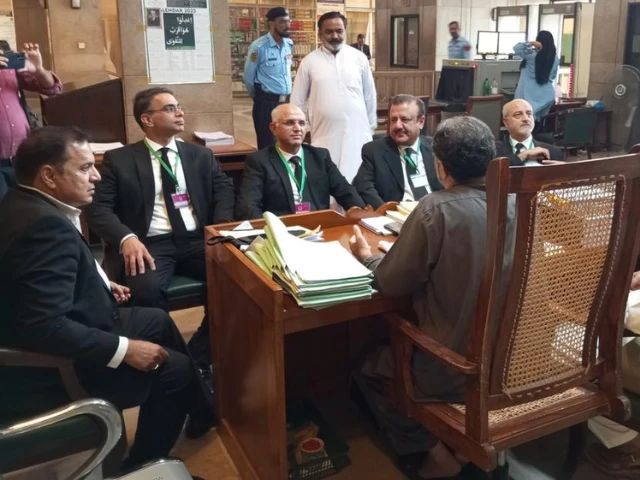Five judges in Islamabad High Court (IHC) have approached the Supreme Court (SC) on Friday and challenged a number of administrative actions from IHC Chief Justice Sarfaraz Dogar, reported Express News.
An unprecedented development has unfolded on IHC when Justices Mohsin Akhtar Kayani, Babar Sattar, Tariq Mahmood Jahangiri, Saman Rafat Imtiaz and Ejaz Ishaq turned together to SC, submitted petitions containing twelve different requirements.
Their petitions filed under Article 184 (2) of the Constitution.
In their petitions, the judges raised a point: “Whether the excessive administrative control carried out by Chief Justice of the Islamabad High Court, which affects legal results through list and clergy, is contrary to the principle of court’s horizontal independence?”
Read more: IHC CJS order stunning legal fraternity
The judges claimed that no judge can be prevented from performing legal duties except under Article 209 of the Constitution and their petitions seek guidance from the point of view on whether Chief Justice’s exercise of administrative powers may override legal functions.
“Whether a Supreme Court’s Supreme Court is assigned any powers that allow him to pose benches in a way that makes the judges of the High Court dysfunctional?” The petries asked.
They questioned whether excessive administrative control, including case management and list of connection, undermines the independence of the right -wing judgments, and whether Chief Justice can constitute benches in a way that makes judge dysfunctional or mid -hearing case.
The petitions further challenged the continued use of the “Master of the Roster” teacher, previously canceled by the Supreme Court, and raised concerns about the legality of the administrative committees formed on February 3 and July 15, 2025.
ALSO READ: Pak-Saudi Defense PACT does not pose a threat to any third country: fo
“Whether the calling of the doctrine of” Master of the Roster “by IHC’s Chief Justice, already canceled by the Supreme Court, allowed under the law?” The petitions asked the point.
The judges claimed that powers under Article 202 for the promotion of rules must be carried out collectively by High Court, rather than solely by Chief Justice, and questioned whether the conversion of collegium into a regimental administrative structure violates constitutional principles.
They also emphasized that the publication and delayed endorsement of Islamabad High Court practice and procedural rules, 2025, may be illegal and raised doubts about the High Court’s failure to establish rules for the functioning of the district court in Islamabad as required by Article 203.
In addition, the judges sought clarity as to whether IHC can issue writings to himself under Article 199 and whether he limits a Supreme Court’s judge from performing court assignments in violation of the Supreme Court, including Landemark -Cases on the former CJP according to Fightikhar Muhammad Chaudhry VS President of Pakistan (PLD 2010 SC 61) and Malik Asad Ali VS Fastation of Pakistan.
Read more: Dar, Asif Tint Defense Pact could expand beyond Saudi -Arabia
The petitions also require cancellation of messages of administrative committees issued in February and July, and declare the latest IHC rules illegal. They claim that High Court cannot issue writings against themselves in accordance with Article 199. When they left the Supreme Court, Justice Mohsin Akhtar Kayani journalists told that all cases assigned to fixed benches had been heard.
Reports suggest that justice jahangiri can personally represent his case. His petition has been awarded a diary number 23409. Justice Jahangiri was suspended from legal work by IHC on September 16 over an alleged false degree. The suspension remains in force until the Supreme Judicial Council (SJC) sets off his judgment.
The petitions were filed in the middle of an unprecedented development at IHC, which has sent shock waves through the legal fraternity. Justice Jahangiri has been excluded from the legal list for the next three days after the court’s decision to limit him from performing any legal tasks until SJC assesses these claims.



